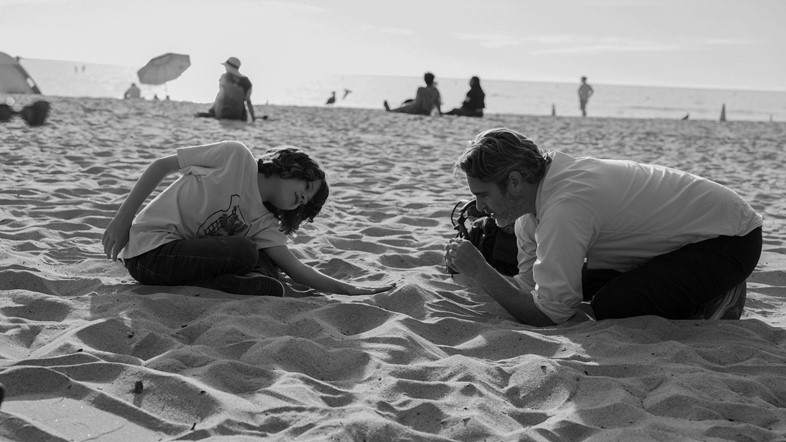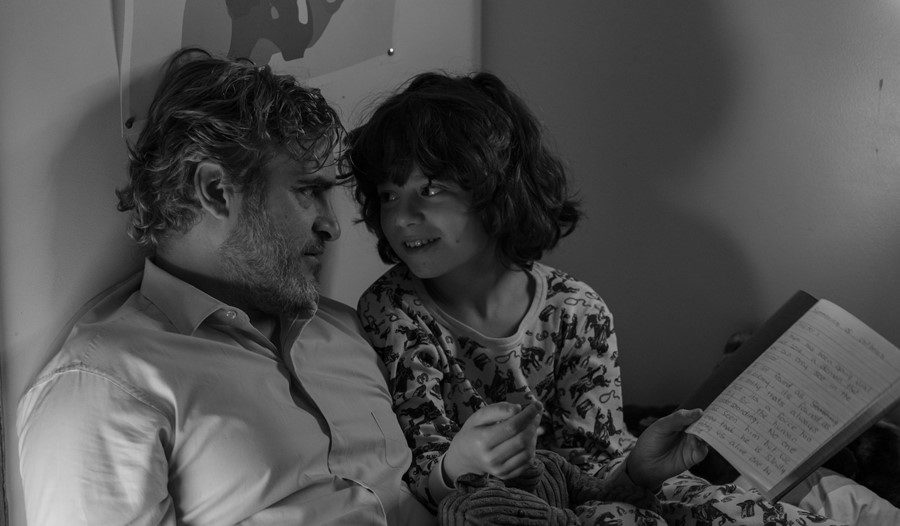The director talks through his new film, C’mon C’mon – a powerfully emotive study of familial dynamics, starring Joaquin Phoenix and Woody Norman
American director Mike Mills makes films about family. In 2010’s Beginners, he explored his father’s cancer diagnosis, and his experience of coming out late in life. His mother was the focal point of 2016’s 20th Century Women, and now, with C’mon C’mon, his child is taking centre stage. The filmmaker’s signature handle on heartfelt sincerity is on display again in this film, too: it’s a tender and poignant depiction of the ways we continue to grow up in life, even as adults. Mills’ command of family dynamics and coming-of-age anxieties, coupled with his attention to the warm familiarity of spaces occupied by those you love, means his filmmaking resides in a realm of profound comfort, with careful insights into how we are shaped by the people around us.
C’mon C’mon follows radio journalist Johnny (Joaquin Phoenix), who plays the somewhat distant yet loving uncle to young Jesse (Woody Norman). Johnny is called upon to look after his nephew by his sister Viv (Gaby Hoffmann) while Jesse’s father struggles through a bipolar episode. It’s a tall order for Johnny, whose work takes him across the country and whose ability to help even himself, let alone a child, is questionable. Yet in becoming a surrogate father-figure for Jesse, he begins to open himself up to a new world of engaging with love and compassion for a family he needs more than he knew. Phoenix and Norman are effortlessly compatible performers; in both their bickering and affection, there is something deeply familial about their energy together. Ahead of the film’s release last week, we caught up with Mills to find out more about its inspirations.
AnOther Magazine: What was the starting point for this film and this story for you?
Mike Mills: My kid – having a kid, being around a kid all the time, and being in love like you’ve never been before, but also the amazing challenges and the stakes of raising a person or them needing you so much, and then needing them yourself. That’s the most consistently meaningful thing that’s ever happened to me. I’ve struggled with meaning before and now there is this volcano of meaning in my life. There’s so much at stake, because not only do you have to keep them alive going across the street but you have to talk to them about the future, you have to talk to them about society at large. From the get-go, I had this feeling that I could pull off the spectrum of something as intimate as giving someone a bath and washing their hair and keeping them entertained while you’re doing that, all the way to “what’s up with America, Dad?” “What’s up with society?” The “personal is political” thing is really alive with raising a kid. So I thought this is the kind of space I’d like to make films from.
AM: When did the idea to shoot in black and white come about?
MM: The honest answer is I love black and white movies. Most of my favourite movies are in black and white and those are the movies I watch over and over again and study. I’ve always wanted to be at that table. All of my films I would have loved to make in black and white, but it didn’t really make sense. To me, black and white – because it’s a crazy abstraction and we don’t see the world like that – does really pull you into art land. It pulls you out of reality. I love Erik Satie a lot, too. For me with Satie’s music, you can enter the music and kind of stand in between the notes. There’s space, right? I feel like there’s a filmic equivalent with black and white, there’s more space for me to enter. It’s speaking to me softer so I lean into it more.
AM: I came away from the film feeling reminded of certain childhood experiences, like falling asleep in the back of my parents’ car, being lulled by the radio and the darkness. Did you have those kinds of references in your mind for this film?
MM: I’m quoting from what I’m seeing with my kid. There’s a fair amount of scenes in the film that are directly pulled from our life. When you have a kid, so much is about bath time and going to bed. I read Star Child to my kid – I have for years, and I cry and my kid doesn’t and then he makes fun of me. My kid used to hide from me and it would scare the shit out of me and we’d get in a fight. So I was watching that more than remembering myself. I think maybe what you just described reminds me of Aaron and Bryce Dessners’ score [from the film]. It’s like oxycontin, you know? It’s like a narcotic. It’s the sound of hugging or something to me, very from-the-sternum kinds of sounds.

AM: What excited you about Joaquin Phoenix’s performance as Johnny?
MM: He was a collaborator for the whole film. To get him to do it, I had to sit with him and act out the script for months. It was so fun. He was really smart about the whole story, not just his part, and he transformed the whole thing in so many ways. Joaquin is very sensitive to what [mothers] really go through, what women really go through. As a writer, you can be expositional, you can be virtue signalling, like “please like me, please think I’m good.” You’re unconsciously doing that all the time, and he would [pull me up on it]. I’m sure I’m still doing it, I’m totally guilty of that. But he helped in a really fun, playful way to get that out and bring in failure and bring in flaws and bring in darkness in a way that’s not alien. It’s held close. He’s playing a me-ish character, but he’s really different: he is smarter, funnier, darker, more dexterous. He’s really funny, too. He’s so good at bringing that into any scene, he’s always hunting for the subversive mini-explosion of laughter. I think as a person, as a soul, Joaquin’s attracted to that, as I am. You never knew where he was going to find a laugh.
AM: The film really seems to be about the way we absorb and experience the world around us, at all ages in life. I was curious about the texts and reading materials you brought into the film to illustrate that?
MM: Pretentious-me loves Godard and Godard does that kind of stuff all the time. I love Milan Kundera’s Unbearable Lightness of Being – the book, not the movie. And I love decentering my voice. So most of those are texts that really stuck out to me in the writing process. Jacqueline Rose’s Mothers: An Essay on Love and Cruelty is such a profound, piercing analysis of motherhood and I felt like Viv would totally have this on her desk and then Johnny could pick it up and read at times. It’s like company for me to have these amazing pieces. You’re still growing as a filmmaker as you’re editing and you’re figuring it out. It’s a little bit like non-consensual company, like if those things are in the film, the film might be okay. I really enjoy the heterogeneity of the authorial voice.
C’Mon C’mon is in cinemas now.
